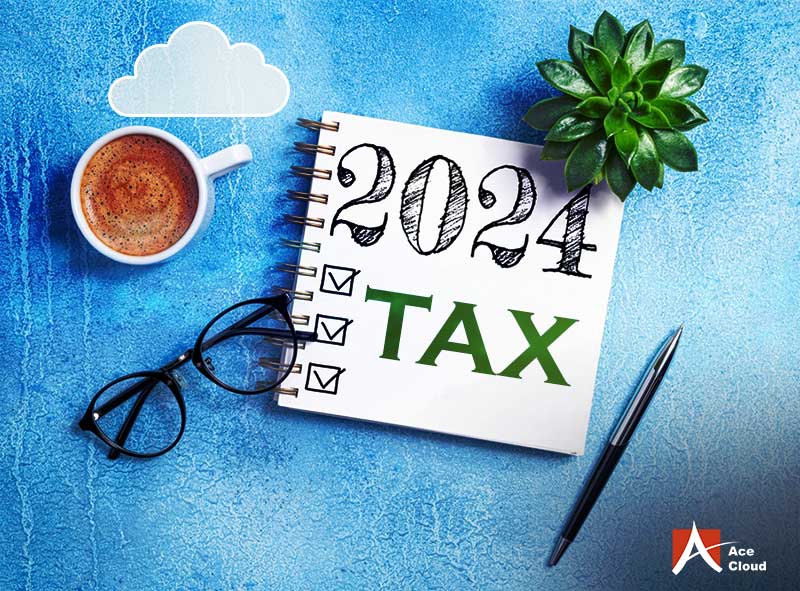Tax season 2024 has begun. The Internal Revenue Service (IRS) expects businesses and individual taxpayers to file over 168 million returns before April 15. Read on for a detailed view of the most crucial information about tax season 2024.
Timeliness is crucial in the world of business taxation. There are multiple key dates and deadlines that demand your attention, from filing various business tax forms to making estimated tax payments. You can ensure compliance and avoid unnecessary penalties by staying informed on these critical timelines.
Who Must File a Tax Return?
Businesses of all sizes and industries must file a tax return to pay federal tax on the income they receive during a financial year. The only exemption to this requirement is for partnerships. They must submit a yearly information return and partner-specific profit/loss reports on their tax returns.
The sorts of taxes due depend on how your firm is set up. Businesses working for themselves must also pay Medicare and Social Security taxes. Besides, they must adhere to the employment tax requirements if several employees work under them.
2024 Tax Deadlines for Different Business Entities
The deadline to file your taxes is just around the corner – on April 15, 2024. Don’t wait until the last minute to file your taxes and risk facing penalties and fines. Take charge of your finances and ensure you meet the deadline by filing your taxes today.
Now is the time for businesses to file taxes, reflect on last year’s success or failure, and set pragmatic financial goals for the next year. Failing to file the taxes by the deadline could result in penalties by the IRS and the tax businesses owe.
| Individual Filers Filing Deadline: April 15, 2024 Extension Deadline: October 15, 2024 | Self-Employed Filers Filing Deadline: April 15, 2024 Extension Deadline: October 15, 2024 | S Corporations (S Corp) Filing Deadline: March 15, 2024 Extension Deadline: September 16, 2024 |
| C Corporations (C Corp) Filing Deadline: April 15, 2024 Extension Deadline: October 15, 2024 | Partnerships Filing Deadline: March 15, 2024 Extension Deadline: September 16, 2024 | Single-Member LLCs Filing Deadline: April 15, 2024 Extension Deadline: October 15, 2024 |
| Multi-Member LLCs Filing Deadline: March 15, 2024 Extension Deadline: September 16, 2024 | Non-Profits Filing Deadline: May 15, 2024 Extension Deadline: November 15, 2024 |
The primary deadline for filing federal income tax returns for the 2023 tax year is April 15, 2024. This deadline is crucial and applies to most taxpayers, including those with tax liabilities for 2023. However, if April 15 falls on a weekend or holiday, the deadline may be extended to the next business day.
Taxpayers can request an extension of up to six months to file their returns. It is important to note that while an extension to file may be granted, any taxes owed must still be paid by the original April 15 deadline to avoid penalties and interest.
What Does April 15, 2024, Tax Returns Due Date Mean for You?
The deadline for submitting your income tax returns and making payments for the 2023 tax year is April 15, 2024. If you need more time to file your returns, you can ask for an extension, but it’s essential to remember that it will not extend the deadline for paying the taxes you owe.
You need to remember that not filing or paying your taxes on time will result in penalties and interest charges, which can accumulate over time. Therefore, it’s crucial to plan ahead and make sure you meet the April 15 deadline.
If you anticipate that you will owe taxes but won’t be able to pay the full amount by the deadline, you should still file your return and pay as much as possible to minimize any penalties and interest.
Extending Tax Filing Deadline? Here’s What You Should Know!
Businesses can request an extension of the tax filing deadline and get more time to prepare their taxes. Although this gives businesses extra time to file taxes, it doesn’t mean they can avoid paying taxes. They still need to pay the tax owed for the business tax deadline, 2023.
Here’s how businesses can benefit by extending the tax filing deadline extension:
- Businesses want to pay the tax but don’t have all the necessary details/documents to file the return
- They are unable to file the return because of personal exigencies
- They think that they’ll get a tax refund and want to get the documents in order
Getting an extension on the tax filing deadline requires businesses to apply for this benefit before the tax return due date.
How To File for Extension?
Here’s a step-by-step guide on applying for a tax extension, ensuring you meet deadlines and stay compliant with the IRS.
Step 1: Determine Your Eligibility
Before applying for a tax extension, ensure that you meet the criteria for eligibility. Individuals and businesses may qualify for an extension, but it’s crucial to understand the specific requirements based on your tax situation.
Step 2: Identify the Appropriate Extension Form
Choose the correct extension form based on your taxpayer category:
- Individuals/sole proprietorship: Form 4868
- Businesses (including partnerships, C corporations, and S corporations): Form 7004
Step 3: Gather the Required Information
Collect all necessary information, including personal or business identification details, estimated tax liability, and other relevant financial information. This ensures a smooth and accurate completion of the extension form.
Step 4: Complete the Extension Form
Fill out the selected extension form accurately. Provide all requested information, including your estimated tax liability and a brief explanation of why you need the extension. Double-check the details to avoid errors that could impact the processing of your extension request.
Step 5: Submit the Extension Form
Once the extension form is completed, submit it to the IRS. The submission methods can vary:
- Online Submission: Many taxpayers opt to file for an extension electronically through the IRS e-file system. This provides a convenient and efficient way to submit your extension request.
- Mail Submission: If you prefer traditional mail, you can send the completed extension form to the appropriate IRS address. Ensure you use the correct mailing address based on your location and the type of extension form.
Form Type:
Partnerships, C corporations, and S corporations – Form 7004
Form 7004: Request an automatic extension of 6 months to file certain business tax, information, and other returns using Form 7004. Find out how to e-file Form 7004.
Sole Proprietorships – Form 4868
Form 4868: U.S. citizens and residents who require an extension to file their tax return must use Form 4868. A maximum six-month extension is granted to taxpayers within the country, whereas those outside receive a four-month extension in addition to the two months they already have.
Step 6: Keep a Record of Your Submission
Retain a copy of the filed extension form and any confirmation or acknowledgment from the IRS. This documentation proves that you applied for an extension and can be valuable in case of any inquiries or discrepancies.
Step 7: Fulfill Tax Payment Obligations
Remember that an extension to file does not grant an extension to pay taxes owed. If you anticipate owing taxes, submit your payment by the original tax deadline to minimize penalties and interest.
Step 8: Monitor the Extended Deadline
Stay informed about the extended deadline granted by the IRS. Use the additional time wisely to gather all necessary documentation and ensure a comprehensive and accurate tax return.
Also Read: Mastering Work-Life Balance: Tips for Accountants in the Busy Tax Season
Challenges Faced During Tax Filing
Businesses face various challenges while filing their taxes during tax season. Here’s a look at some of the most common ones:
- Complex tax laws and regulations: Tax laws and regulations change constantly and can be complex, making it difficult for businesses to keep up with the latest requirements and ensure their tax filings are accurate and in compliance with the law.
- Record Keeping: Keeping accurate records of all financial transactions is crucial for tax filing but can be time-consuming and challenging for small businesses.
- Data Management: With the increasing volume of financial data, businesses need help managing, storing, and accessing their data efficiently. It often leads to errors in tax filings and causes additional work for tax filers.
- Deadlines: The tax filing deadlines can be stressful for businesses, especially if they need to catch up on their record-keeping or data management tasks.
Businesses can host their tax software on the cloud to simplify their tax filing process.
Reshape Your Tax Filing Experience with Cloud Tax Software
Tax software cloud hosting offers a robust solution for businesses and individuals seeking a streamlined and secure tax filing experience. Below, we explore the key benefits and considerations of embracing cloud-based tax software hosting:
- Accessibility: Cloud-based tax software allows businesses to access their tax data and tax software from any device with an internet connection, making it easier for them to manage their taxes from anywhere, anytime.
- Data Management: Tax software Cloud hosting enables businesses to store their financial data securely and access it easily, reducing the risk of data loss and errors in tax filings.
- Integration: Cloud-hosted tax software seamlessly integrates with other business systems, such as accounting software, making it easier for businesses to manage their financial data and prepare their tax returns.
- Cost-Efficiency: Eliminate the need for expensive in-house IT infrastructure. Cloud hosting operates on a subscription-based model, reducing upfront costs and allowing businesses to pay for the resources they use. This cost-effectiveness is particularly appealing for small to medium-sized businesses seeking budget-friendly solutions.
- Disaster Recovery and Business Continuity: Cloud hosting providers often include robust disaster recovery plans. In the event of data loss or system failures, your tax data is backed up and can be quickly restored, minimizing downtime and ensuring business continuity during critical periods.
- Compliance Assurance: Many reputable cloud hosting providers adhere to industry-specific compliance standards. This can be crucial for businesses dealing with sensitive financial information, assuring that relevant regulations and compliance requirements handle your tax data.
Tax software cloud hosting revolutionizes the tax filing experience by offering unparalleled flexibility, collaboration, security, and cost-efficiency. By hosting their tax software on the cloud, businesses can simplify their tax filing processes, reduce their workload, and minimize the risk of errors and compliance issues.
As tax season approaches, businesses and individuals alike can benefit significantly from embracing this advanced technology to streamline their tax preparation processes.
Looking to try tax software on the cloud for your business? Get in touch with our experts at +1-855-223-4887.







